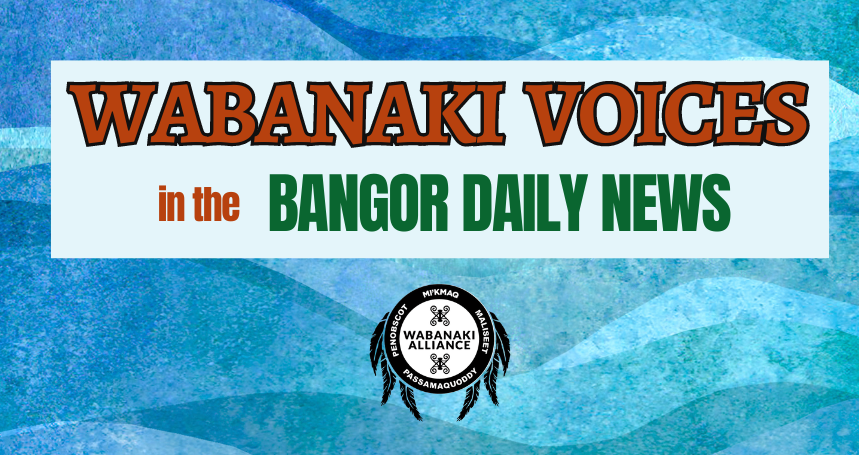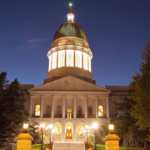The May Wabanaki Voices column was written by Rep. Aaron M. Dana, the Passamaquoddy tribal representative to the Maine House of Representatives and a member of the Wabanaki Alliance board of directors. Wabanaki voices is a monthly column in the Bangor Daily News opinion section that shares tribal perspectives. Read all Wabanaki Voices columns here.
The 131st legislative session has ended. The legislative process is one of compromises and disappointments for any group that is trying to pass legislation. That is no different for the Wabanaki Alliance.
The Wabanaki Alliance is a nonprofit organization that educates Mainers on the culture and history of the four federally recognized tribes in Maine: Mi’kmaq Nation, Houlton Band of Maliseet Indians, Passamaquoddy Tribe and Penobscot Nation. We also advocate for legislation that would better not only the tribal communities, but the surrounding rural communities as well. The tribes made compromises and had disappointments in this legislative session.
LD 2007, An Act to Advance Self-determination for Wabanaki Nations, was an omnibus piece of legislation that would have placed the tribes on the same footing as the other 570 federally recognized tribes across the country. However, Gov. Janet Mills has opposed much of the tribes’ efforts in the quest to be treated like other tribes across America. Though we disagree with her stance on numerous tribal issues, we were willing to work with her on a compromise piece of legislation that would restore a kernel of rights to the tribes.
The title for LD 2007 eventually changed to “An Act Regarding the Criminal Jurisdiction of Tribal Courts and to Extend the Time for the Penobscot Nation to Certify Its Agreement to Public Law 2023, Chapter 369.” This legislation now allows the tribal nations to prosecute misdemeanors and some felony offenses that occur on tribal lands in Wabanaki courts. The legislation would also allow the Penobscot Nation to regulate drinking water on its tribal lands.
This legislation is a far cry from treating the tribes the same as other tribes across the country. However, this is a small step in the right direction and displays our willingness to compromise. As Martin Luther King Jr. famously said, “The arc of the moral universe is long, but it bends toward justice.” The arc has bent toward justice with this legislation, just a small amount, but some nonetheless.
There were also disappointments. Being able to support a tribal nation means having the financial resources necessary to invest in new businesses, schools, health care and numerous other tribal ventures. President Richard Nixon understood the importance of self-determination for the tribes.
Nixon championed the sovereignty of tribes across America. He was the first president to give lands back to Native American tribes. Nixon believed that Native Americans had a right to self-determination and education. This is why he supported the Indian Education Act in 1972. President Gerald Ford carried Nixon’s legacy forward by signing the Indian Self-Determination and Education Assistance Act of 1975.
This time period opened up a period of self-determination for tribes across the country but, in 1980, the Maine Indian Claims Settlement Act changed that for the tribes in Maine. Until this day, the tribes in Maine are treated less than the other 570 federally recognized tribes across the country. As you can see by the graph below, since 1989, tribes located outside of Maine have seen a growth of per capita income at 61 percent while the tribes in Maine have only seen an increase of 9 percent. The restrictive settlement act has hampered the ability of tribes in Maine to foster economic development.
This leads to our disappointment with the legislative session. The tribes were unable to advance legislation that would have allowed Wabanaki Nations to conduct online gaming beyond sports betting, such as poker and blackjack. Though there was legislative support, the legislation did not pass.
People have a tendency to believe that gambling and tribes are synonymous because many tribes own casinos across the country. (Here in Maine the two casinos are owned by large corporations that send the proceeds back to their headquarters in Kentucky and Pennsylvania.) What people don’t seem to understand is that the revenue from tribal gaming operations is reinvested into other government and business ventures to benefit tribal citizens.
If the tribes were allowed to conduct gaming outside of sports betting in Maine, those proceeds would be reinvested into businesses creating jobs in rural Maine for tribal citizens and non-tribal members alike. The profits would go toward important tribal functions like health care, education, housing and numerous other benefits to the tribes and the surrounding areas in rural Maine.
Were the tribes enormously successful this session? No. Were there disappointments? Yes. Was there progress? Incremental. We will continue to advocate for the betterment of tribal citizens next session, and the one after that, until the tribes in Maine are not treated less than other tribes across the country. Nothing more and nothing less.





